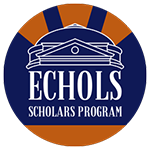The Echols Scholars Program was created by the University of Virginia Faculty Senate in 1960. At the time, the University Faculty were eager to create an Honors Program in the rapidly expanding College of Arts and Sciences. The University had grown rapidly in the 1950s, largely due to the influx of Second World War veterans enrolling under the G.I. Bill. Peer universities had reacted to a similar explosion in student numbers by creating innovative programs; the University of Virginia sought a similar goal by a unique solution. Rather than create a purely financial merit scholarship, or an entirely new honors college with its own faculty and courses, the Faculty Senate decided upon a model which would provide ambitious academic privileges to students while retaining them within the College of Arts & Sciences. Additionally, the faculty decided upon the common living environment in order to provide for community and regular interaction among the Scholars.
Students selected for the Honors Program were assigned to live in Echols House, one of the now “old dorms” on McCormick Road. The first class of Scholars, all male (the University did not become co-educational until 1970) graduated in 1964. The first female Echols Scholars graduated in 1974.
By living in the Echols dorm, they soon became known around the Grounds of the University as the “Echols Scholars” and the name stuck. In the late 1970s, Echols Scholars moved to Dunnington, Webb, Maupin, and Watson dormitories and in fall 2012 Echols Scholars occupied the newly built Balz-Dobie and Watson-Webb residence halls.
The Echols Scholars Program expanded rapidly in the late 1970s and early 1980s. From the original class of a few dozen students in 1964, the Program was enrolling almost 200 students annually by 1994. As a percentage of total College enrollment, however, the Program has remained relatively stable over the past 10 to 15 years. In 2012, Echols Scholars comprised approximately 10.0% of the total College population.
A Fitting Example in Professor Echols
The Echols dormitory, from which the Program draws is name, was itself named after one of the University’s most distinguished faculty, Professor William Holding Echols. Professor Echols (1859-1934) was one of the most colorful, admired, and versatile members of the faculty in the early 20th century. He took an undergraduate degree in science and civil engineering from U.Va., became a railroad engineer in the South and then a mining engineer in the West, taught mathematics at the Missouri School of Mines, and returned to his alma mater as Professor of Mathematics in 1891. He published papers in both pure and applied mathematics, and remained at the University until his death in 1934. For many years he resided in Pavilion VIII on the East Lawn, and a plaque honoring him is attached to the wall outside the Pavilion.
Professor Echols became an instant legend at the University and was regarded as a model of fierce determination and enterprise on the occasion of the great Rotunda fire of 1895. As Virginius Dabney tells it in his Mr. Jefferson’s University: A History, the University bellringer brought faculty and students running to the Lawn to fight the blaze, which had started in recently installed wiring. Dabney notes that “at their head was Professor William H. Echols, who had supervision of the buildings and grounds. “Reddy” Echols (referring to his hair color) was “utterly fearless. At considerable risk, he tried, without result, to check the flames raging through the [Rotunda] Annex [this 19th century addition has subsequently been removed].He then put together a hundred pounds of dynamite and attempted to blast away the link between the Annex and Rotunda, to keep the fires from spreading.” This failed, and he then climbed to the Rotunda Dome and hurled a sack of explosives on the connecting structure while flames lept around him. The detonation was heard 15 miles away, but had no effect, and the Rotunda was left a gutted shell.
Professor Echols “was a gripping lecturer and was venerated by the students.” When he died, the Richmond News Leader summed up his significance to the University: “Sometimes a man emerges that incarnates the spirit of the whole body of which he is a member. Such a man was “Reddy” Echols, for though he would have been the last to claim or realize it, yet in him was a burning and shining light which was the vital spirit of the University.”
He is a fitting example, therefore, for the intellectual enterprise, community, and service that characterizes Echols Scholars to this day.
Deans of the Echols Scholars Program
The Director of the Echols Scholars Program is appointed by the Dean of Arts & Sciences. Some of the University’s most eminent faculty have served in this post, and have provided inspiration to thousands of students. Traditionally, the Echols Dean continues to teach in his or her academic Department while holding the post. The inaugural Dean was Professor Francis Brooke of the German Department. Other early Deans were Professors Walter Heilbronner, also of the German Department, Alan Williams, of History, Marcus Mallett, of Philosophy, and Harry Gamble, of Religious Studies.
The longest serving and indisputably most influential Echols Scholars Dean was the late Charles A. Vandersee of the English Department. From 1973-1997 he presided over the expansion and strengthening of the Program in an era of rapid and pronounced change for the University. At the time of his death, in January 2003, thousands of Echols Alumni paid their respects to his legacy. The Vandersee Scholarship was created in his memory.
Since 1997, the Echols Scholars Program has continued under the stewardship of Professors Jon Mikalson of the Classics Department (1997-2000); Lynn A. Davis, of Biology (2000-2002); James Sofka, of Politics (2002-2005); and William Wilson of Religious Studies (2005-2012), and Lynn A. Davis, Interim Dean (2012 – present).

